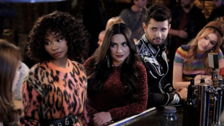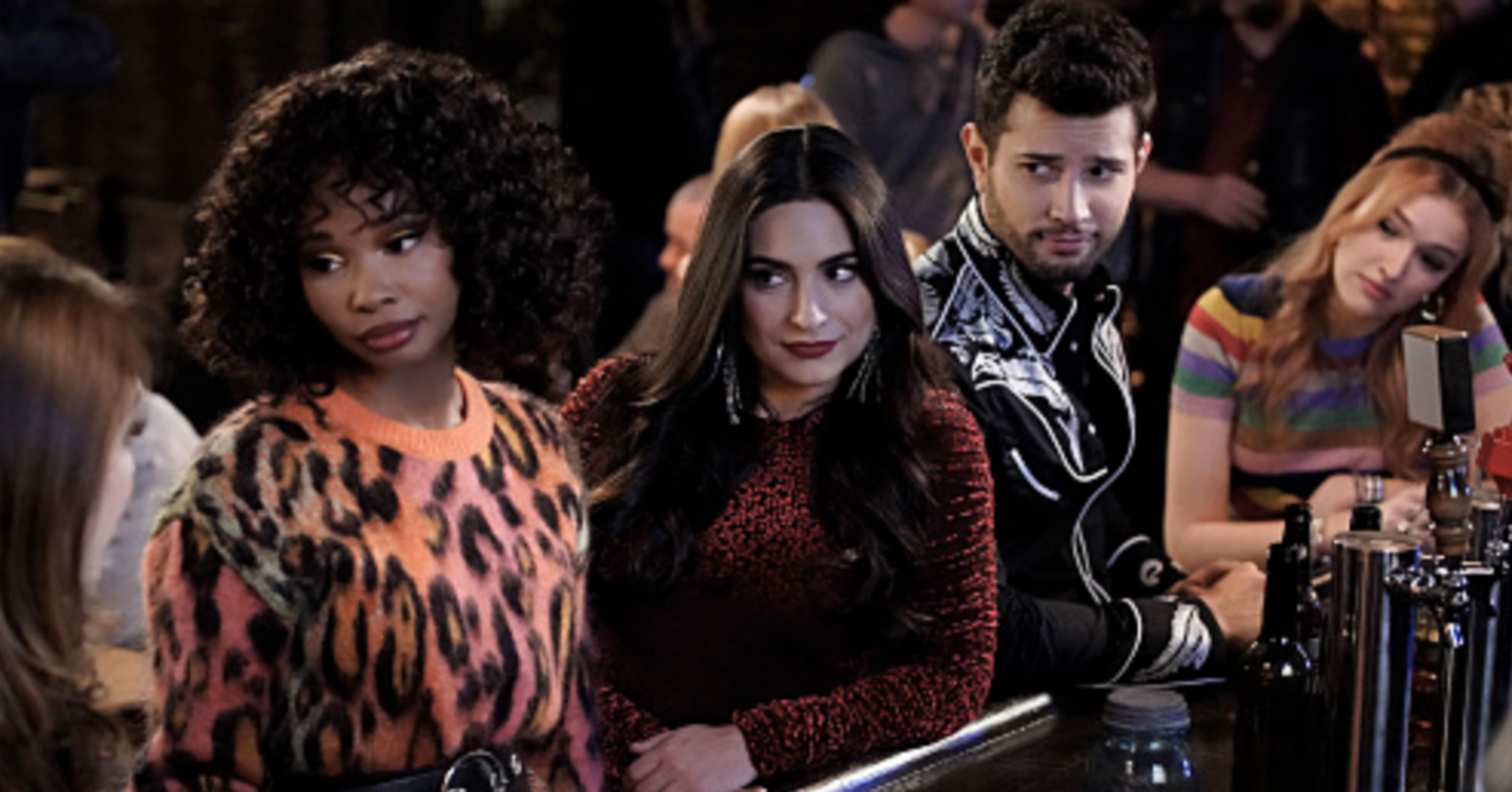[ad_1]

In a decade of reboot deluge, the 1980s series “Dynasty” has strutted back. The show, this time on The CW, has swapped characters’ genders and relocated from Denver to Atlanta. Fans watch for the soap opera’s legendary fashion choices and built-to-be-memed moments, but they stay for a reason less apparent. Underneath the show’s facade of billionaire and heiress melodrama lies an authentically urgent tale that revolves primarily around immigrants in the U.S.
More specifically, Venezuelan immigrants, whose story of crisis is rarely told on screen.
The original “Dynasty” production can be described as 50 shades of white, but the rebooted version places diversity at the forefront. In addition to the decision to make infamous business rival Jeff Colby (Sam Adegoke) and his family Nigerian-American — they often wear traditional garb and speak Yoruba on multiple occasions — stepmother Cristal Flores (Nathalie Kelley) and her nephew Sammy Jo (Rafael de la Fuente) are now Venezuelan immigrants who’ve come to America to escape personal and political chaos in their home country. And instead of just casting people of color (de la Fuente is from Venezuela himself) and leaving it at that, “Dynasty” seamlessly integrates Venezuelan culture and the nation’s socio-economic crisis directly into the plot.
Venezuela’s troubles couldn’t fit better into “Dynasty” with its narrative revolving around the corrupt energy industry. The fact that the Venezuelan government is deeply reliant on the export of oil and gas is a global reality the show can’t ignore. By tying its Venezuelan characters directly to the petrostate’s upheaval — intensified by recent drops in oil prices, which have left the population plagued by hyperinflation, hunger and disease, as well as rapidly increasing crime and death rates — the show’s writers are able to illuminate why, according to the BBC, 2.3 million people have fled that nation since 2014.
Of course, “Dynasty” is still a soap opera, so the message arrives tightly wrapped in the genre’s tropes. At the start of the first season, Cristal, who’s head of public relations for Carrington Atlantic, is engaged to marry energy mogul Blake Carrington (Grant Show). Dressed in the best designers that Carrington money can buy, Cristal has no choice but to quickly adjust to the family’s secretive and often illegal antics. She regularly competes in debates with future stepdaughter Fallon, who can’t stand the sight of Cristal. Fallon is ferocious, spewing damaging remarks about Cristal’s past relationships and motives. It’s apparent that Cristal is hiding something, but no one is quite sure what.
The family’s butler ultimately unveils the shocking secret: Cristal’s apparent identity is not her own. She stole it after escaping Venezuela and fleeing to the United States. The ensuing story rides on the new Mrs. Carrington’s hellbent desire to hide her troublesome past from her future husband.
The backstory is fantastical yet packed with glimpses of nonfiction. Back in Venezuela, Cristal was trapped in a home with sister Iris Machado (Elena Tovar) and Iris’ abusive boyfriend. In an attempt to break free, the two women made plans to run away with a large stash of the boyfriend’s money. But when it came time to leave, Iris didn’t make it. Sammy Jo, Iris’ son, followed years later and clung to Cristal as his only family in the states. As she became more established in America, specifically at Carrington Atlantic, Cristal began sending money back home to assist Iris, still living in a poverty-stricken Venezuela in 2018.
The true-life crisis in Venezuela dates back to 1999 when then-President Hugo Chávez took power. Under his self-defined socialist government, the nation began to experience inequality on all fronts. Over time, shortages increased in food, medicine and other goods; unemployment and sickness rates escalated; crime rose to an all-time high. In 2013, following Chávez’s death, Nicolás Maduro was elected president (though critics claim the election was rigged) and the situation in Venezuela only got worse. The following year, oil prices dropped drastically, throwing the government into economic turmoil. Inflation soared to the point of poverty and famine. Since 2010, the nation has been in a state of economic war.
Many blame both Chávez and Maduro for the crisis, arguing that their corrupt socialist policies wreaked havoc on the already struggling nation. Over the course of just 20 years, Venezuela has turned into a land of suffering and of rage against a failing government.
The complexities of immigration and family separation under President Donald Trump bleed into ‘Dynasty’ in multiple ways.
“Dynasty” is one of the only television programs showing U.S. audiences a picture of that crisis on a consistent basis. In fact, until recently when the troubles in Venezuela escalated, they were barely receiving any airtime on major network news programs.
In the first half of the premiere season, Sammy Jo is constantly worried about his mother, pleading with Cristal to help Iris navigate the situation back home. At one point, the Carringtons bring Iris to Atlanta for the holidays, but the family reunion is one of hostility. Iris claims that Cristal has forgotten where she came from, what she was thankfully able to escape.
The complexities of immigration and family separation under President Donald Trump bleed into “Dynasty” in multiple ways. Sammy Jo was able to escape Venezuela under the care of Cristal, but his visa has since expired and he is now in the country illegally. No one on the show is aware of this — understandably so, as Sammy Jo wouldn’t want to disclose this to Blake, the epitome of white privilege — until Blake’s father attends a gathering and meets Sammy Jo for the first time. Overhearing Sammy Jo talking about his immigration status with his future fiance, Steven (Blake’s son), the grandfather calls ICE. It’s a painful scenario to watch, largely because the events feel far from fictional.
“Dynasty” writers don’t use Venezuela as a point of conflict alone. They also incorporate Venezuelan culture and language into the show, often focusing on Cristal and Sammy Jo’s rich background. The two speak in Spanish to one another and refer back to the good moments they had in Venezuela. One Thanksgiving, Sammy Jo wants to prepare a Venezuelan family recipe — pan de jamon — to bring a part of his culture to the American holiday. Each of these interjections might seem small, but the sprinkling of them throughout the show’s first season brought so much of the culture to “Dynasty.”
The show is far from a perfect piece of advocacy. Cristal isn’t working with her wealthy husband to address the hyperinflation in Venezuela, and Sammy Jo isn’t publicly protesting against Maduro. But the message is there: Venezuela is in trouble and it’s time that the United States started paying attention. As comedic and petty as “Dynasty” sometimes feels, it achieves what similar shows like “Gossip Girl” and “Pretty Little Liars” never did: It uses the storytelling power of a genre known for comatose romance and evil twins to shed light on an under-discussed calamity in the real world.
In a sea of shows that remind us what TV was like yesterday, “Dynasty” is masterfully showing us what it can look like today.
Gianluca Russo is a New York-based freelance writer published in GQ, Glamour, Teen Vogue, NYLON, Vice and more.
[ad_2]
Source link

